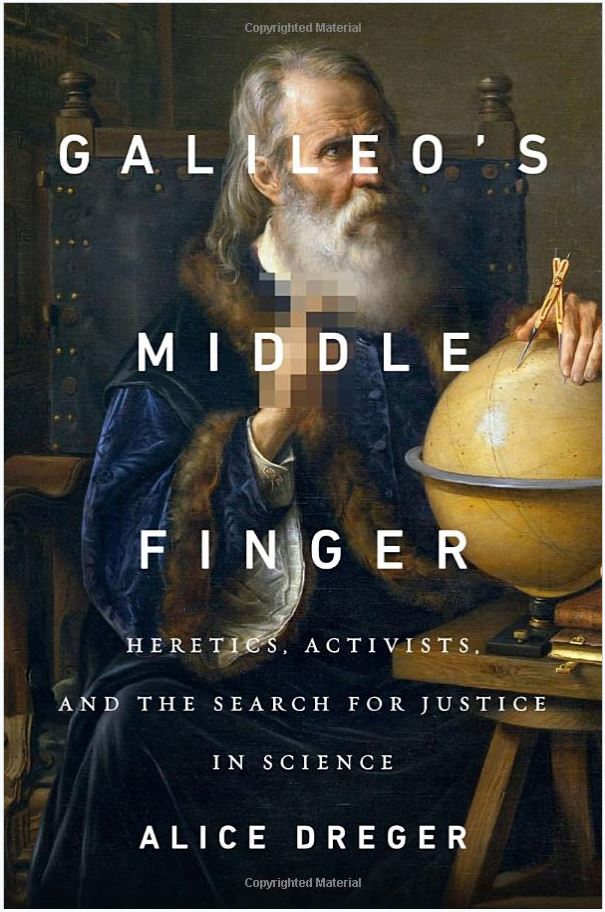 It dates back at least to Galileo. A scientist finds evidence that contradicts a cherished popular belief. Instead of a rational examination of his evidence, he is subjected to vicious personal attacks. Alice Dreger examines the phenomenon in her book Galileo’s Middle Finger: Heretics, Activists, and the Search for Justice in Science. She is eminently qualified to do so. She is a professor of clinical medical humanities and bioethics, a historian, a gifted writer, an activist for patient rights, and an indefatigable investigative journalist who has herself been a victim of the kind of persecution she describes.
It dates back at least to Galileo. A scientist finds evidence that contradicts a cherished popular belief. Instead of a rational examination of his evidence, he is subjected to vicious personal attacks. Alice Dreger examines the phenomenon in her book Galileo’s Middle Finger: Heretics, Activists, and the Search for Justice in Science. She is eminently qualified to do so. She is a professor of clinical medical humanities and bioethics, a historian, a gifted writer, an activist for patient rights, and an indefatigable investigative journalist who has herself been a victim of the kind of persecution she describes.
The histories she recounts are horrifying. She gives example after example of activists using lies and personal attacks to suppress evidence they don’t like. She reveals dirty linen in the most unexpected places.
Bailey and transgender
A subset of the LGBT community became incensed when sex researcher Michael Bailey suggested that transgender is more complicated than just a matter of being born with the body of one sex and the brain of another, that transgender identity is not just about core inborn gender, but it also involves sexual orientation and erotic feelings. They mounted a sophisticated campaign to bury that idea by killing the messenger (the specifics are discussed in exhaustive and fascinating detail in a 2008 article by Dreger). Led by a trio of powerful transgender women, they falsely accused him of serious crimes including abusing the rights of subjects, having sex with a transsexual research subject, and making up data. They even insinuated that he had been sodomizing his own children. They nearly ruined his career and his life.
Dreger was already an activist for the rights of intersex children, fighting to prevent children born with ambiguous genitalia from being surgically altered just to satisfy the prejudices of adults. She advocated waiting and allowing them to make that decision for themselves when they reach maturity. She had been working with the transgender community, and she became embroiled in the controversy over Bailey’s findings. Her meticulous research uncovered facts that directly contradicted the accusations; for instance, on the date Bailey was supposed to have had sex with the transgender subject, there was clear proof that he had been in a different city. The whole campaign against him was an obvious setup. When she published her findings, she was portrayed as an enemy of intersex people and an enemy of all LGBT people. Lies were told about her, for instance that she was driven out of a job for bad behavior, when she had voluntarily changed jobs for purely personal reasons. The animosity and venom reached incredible heights.
A repeating pattern
A pattern repeats itself. The scientist’s message is distorted; critics often don’t bother to read the book or the article in question, but are content to rely on someone else’s garbled misinterpretation. They are not angry about what the scientist actually said, but about what they think he or she said. When E. O. Wilson wrote his book Sociobiology, his intent was to help humans understand their own nature. His message was misrepresented as an attempt to exonerate people from responsibility for crimes or social problems, and even as supporting “the eugenics policies which led to the establishment of gas chambers in Nazi Germany.” Hatred of Wilson escalated to the point that a group of his detractors rushed onstage and doused him with a pitcher of water at a scientific conference.
The persecution of Chagnon
Napoleon Chagnon is a cultural anthropologist who studied the Yanomamo tribe in the Amazon, living with them for long periods. In contradiction to the anodyne image of the peaceful, noble savage, he found “the fierce people.” Males fought wars and fought violently over fertile females; there was domestic brutality, ritualized drug use, and ecological indifference. This was a message that disturbed a lot of people. Instead of examining his findings, they resorted to personal attacks. A journalist, Patrick Tierney, wrote a book accusing Chagnon of atrocities against the Yanomamo people, such as deliberately starting wars and causing a measles epidemic with a bad vaccine and then withholding medical care. The American Anthropological Association appointed a task force to investigate, but it did such a poor job that its findings later had to be rescinded. Chagnon’s reputation was ruined.
A little basic fact checking would have put paid to most of Tierney’s accusations, as Dreger was able to demonstrate with her own investigation many years later. Tierney cited a dossier by Leda Martin as evidence for the charges against Chagnon. Dreger contacted Martin and learned that Tierney wrote the dossier himself, gave it to Martin to translate, and then pretended Martin was the author. One of the most damning pieces of evidence related to a doctor who had worked with Chagnon during the measles epidemic. Actually, it was no more than hearsay. It was what the doctor’s son said his father had told him in a private conversation. The doctor had since died, but Dreger contacted the doctor’s son, who now believes his father made up the story to make himself look good, something he had a pattern of doing on other occasions.
Childhood sexual abuse
Bruce Rind and his colleagues published a meta-analysis of studies of college students who had been targets of sexual advances by adults when they were children. They analyzed which factors were more likely to be associated with long-term psychological harm (female sex, incest), and suggested that it didn’t make sense to lump together (a) molestation of a five-year-old by a sixty-year-old and (b) consensual sex between a sixteen-year-old and a twenty-year old. Both were categorized as childhood sexual abuse (CSA), but the former was more likely to result in long-term psychological harm than the latter.
They found that in a surprising proportion of cases, CSA doesn’t result in lasting harm. This should have been good news, reassuring evidence of human resilience. Instead, they were accused of promoting pedophilia! The Rind study aroused such outrage that its scientific findings were condemned by an act of Congress, the only time in history that has ever happened.
Richard Dawkins has recently been vilified for saying essentially the same thing, that the kind of “mild pedophilia” he experienced as a child in an English boarding school did not cause lasting harm. He tried to put that kind of abuse into historical perspective, saying it was not condemned at the time the way it would be condemned today. His words were interpreted by his critics to mean that he condones pedophilia, the exact opposite of what he said: “by the same standards as I or anyone would [condemn it] today.” On Twitter, Dawkins responded, “Mild pedophilia is bad. Violent pedophilia is worse. If you think that’s an endorsement of mild pedophilia, go away and learn how to think.” By analogy, theft is always wrong, and the law universally condemns and punishes it; but the law recognizes that grand theft is worse than petty theft. Bernie Madoff got a harsher punishment than an adolescent with a first-time shoplifting offense, but that doesn’t constitute an endorsement of shoplifting.
More examples
Similar outrage followed the finding that rape has a sexual component and is not merely an expression of violence. Which makes sense: if there were no sexual component, rapists would be just as likely to choose some other form of violence, and no rapist would ever be able to sustain an erection and impregnate a victim. The scientists involved got death threats.
Elizabeth Loftus got into very deep trouble for finding that human memory is fallible and that some allegations of child sexual abuse were based on false “recovered repressed memories” of events that never happened. She was accused of denying the possibility of child sexual abuse and attacking its victims, something she absolutely did not do. She was even sued over what she wrote, but her work was eventually vindicated.
Unethical treatment for CAH
Dreger’s latest activism has to do with congenital adrenal hyperplasia (CAH), a condition where exposure to excess male hormones in utero can lead to masculinized genitalia in a female child. Genetic testing can identify who is at risk; and a pediatric endocrinologist named Maria New, among others, has been treating those women with the steroid dexamethasone to prevent intersex anomalies. Only female fetuses are affected, but the treatment often has to be started even before the sex of the fetus is known. Since the gene is recessive, only one in four female fetuses will be affected, and there is considerable variation in how much they are affected, ranging from a nearly typical female to a nearly typical male appearance. There has been only one published case report of an assumed successful treatment with dexamethasone. No controlled studies. So prenatal use of dexamethasone for CAH is an off-label use of a drug that has not been shown to work, and must be considered unethical outside of controlled studies. Dreger’s investigations found a host of problems: violation of research standards, lack of informed consent, misrepresentations, lack of follow-up, and even direct evidence that the treatment can be harmful. Adverse effects include growth disorders, mood disorders, and mental retardation; and boys accidentally exposed to dexamethasone may be genitally and behaviorally feminized. A trial in Sweden was shut down because of these concerns, and the researchers said they would no longer provide the intervention even in the context of a prospective clinical trial.
Conclusion: Good intentions, bad results, worse reporting
Good people with the best intentions can do bad things. Dreger concludes that we need both scholars and activists; we need people pushing for truth and for justice if we’re going to get both right. She is fair to both sides: she exposes the sins of activists and the sins of scientists and scientific institutions. Highly respected thinkers like Jared Diamond, Edward O. Wilson, Elizabeth Loftus, and Steven Pinker have endorsed the book. Diamond says it would be “this year’s most gripping novel” except that her stories are true. Wilson says she “reveals the shocking extent to which some disciplines have been infested by mountebanks, poseurs and even worse, political activists who put ideology ahead of science.” A good read, valuable information, a cautionary tale, and plenty of food for thought.

